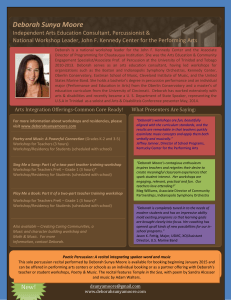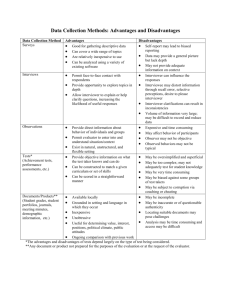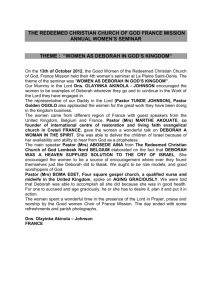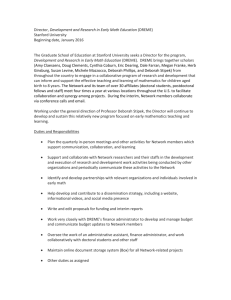MIT Leadership Center - MIT Sloan School of Management
advertisement
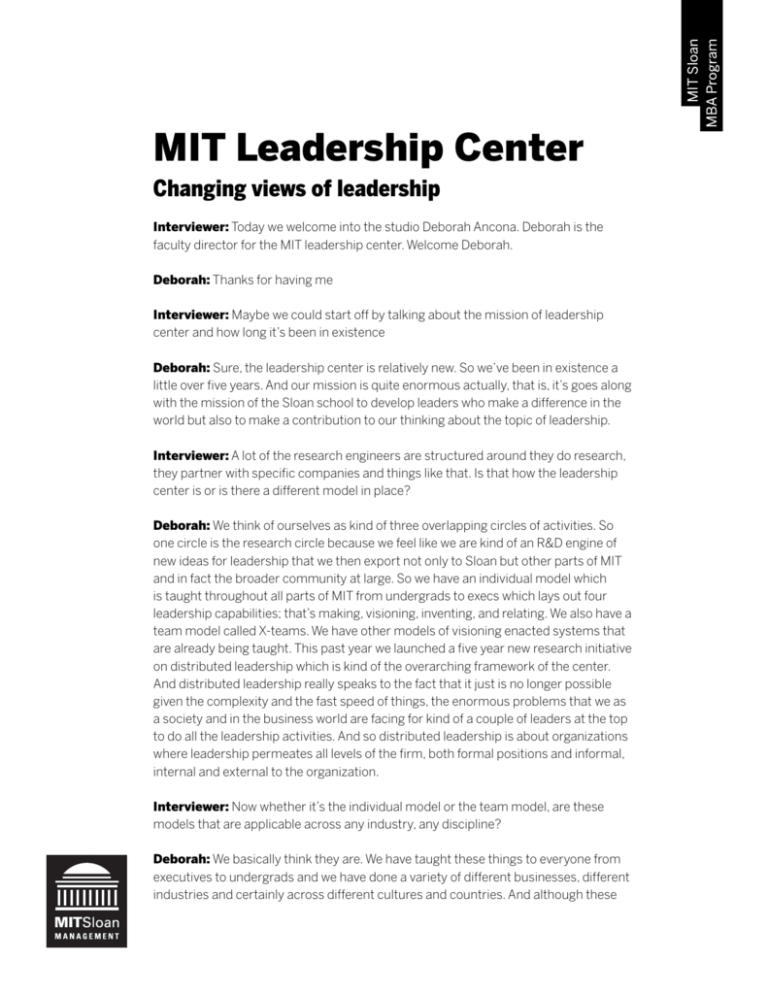
MIT Leadership Center Changing views of leadership Interviewer: Today we welcome into the studio Deborah Ancona. Deborah is the faculty director for the MIT leadership center. Welcome Deborah. Deborah: Thanks for having me Interviewer: Maybe we could start off by talking about the mission of leadership center and how long it’s been in existence Deborah: Sure, the leadership center is relatively new. So we’ve been in existence a little over five years. And our mission is quite enormous actually, that is, it’s goes along with the mission of the Sloan school to develop leaders who make a difference in the world but also to make a contribution to our thinking about the topic of leadership. Interviewer: A lot of the research engineers are structured around they do research, they partner with specific companies and things like that. Is that how the leadership center is or is there a different model in place? Deborah: We think of ourselves as kind of three overlapping circles of activities. So one circle is the research circle because we feel like we are kind of an R&D engine of new ideas for leadership that we then export not only to Sloan but other parts of MIT and in fact the broader community at large. So we have an individual model which is taught throughout all parts of MIT from undergrads to execs which lays out four leadership capabilities; that’s making, visioning, inventing, and relating. We also have a team model called X-teams. We have other models of visioning enacted systems that are already being taught. This past year we launched a five year new research initiative on distributed leadership which is kind of the overarching framework of the center. And distributed leadership really speaks to the fact that it just is no longer possible given the complexity and the fast speed of things, the enormous problems that we as a society and in the business world are facing for kind of a couple of leaders at the top to do all the leadership activities. And so distributed leadership is about organizations where leadership permeates all levels of the firm, both formal positions and informal, internal and external to the organization. Interviewer: Now whether it’s the individual model or the team model, are these models that are applicable across any industry, any discipline? Deborah: We basically think they are. We have taught these things to everyone from executives to undergrads and we have done a variety of different businesses, different industries and certainly across different cultures and countries. And although these things are used slightly differently, they seem to work across contexts. Interviewer: Is it an over simplification to look at distributed leadership as leadership that goes along with someone that has the expertise in a particular area like technology or a particular level of the company? Deborah: Well certainly part of what you’re looking for is the person who has the greatest expertise, or the closeness to the customer, the closeness to the technology, the person who really knows what going on on the ground or really knows a particular region to take more leadership responsibility. But I think it’s actually beyond that. It is enabling people who have motivation, who can gain commitment, who have great ideas, to take those ideas and run with them to the extent that they’re good ideas and they’ve been vetted and there are controls in place. But it’s a whole different mind set. So rather than people sort of sitting around and waiting for the direction to come, it is really taking the responsibility of leadership and spreading it so that people don’t just sit and wait. They say, yes we can move here, we can do something, and I’m going to do it, or we’re going to do it. Interviewer: And so I can imagine that in some senses that would require a bit of a cultural change in an organization that is used to being very talked[top?] down. Deborah: Yes, I mean there are some organizations, we call them the DNA organizations, that have been this way since day one. And so they have other kinds of issues like scaling issues or globalization issues. But for the larger bureaucratic organizations, this is for many a large cultural change. For many new kinds of networked organizations that are just forming right now, again this is more the norm than it is the exception. Interviewer: It seems like the leadership center is something that is very organic to MIT and that that approach is not something that you necessarily might expect to find say at Harvard Business School. Deborah: Well I mean certainly Harvard has great people who are working on leadership. I think we differ perhaps on several dimensions. First of all, we are very much action-learning kind of environment. So the way to learn leadership we think is not only through reading cases, not only through learning a theory, in fact we don’t want people to regurgitate the theory, what we want is for people to take the theory and be able to live it, use it. So are models actually are pretty simple so that people can move directly into action with them. And when the action learn some things come back and say okay what did I learn from this experience? How can I be better as a leader? So we have, whether it’s through trips or our consulting around the world, they are again using some of our concepts and learning not just about a different country or about entrepreneurship, but also how to be more effective leaders and teams. Interviewer: I can see just from your examples with the students and the G-labs how important the reflection component is after you go out and apply these things to come back and reflect on what was successful and what wasn’t. Deborah: Absolutely, and you know, we build in the 360 as a form of reflection; how we just in our introductory organization processes course had team day, where students had to reflect on how they’re working as a team, how well are they doing, whether they want to change. So there are constant cycles of thinking about what it is you want to do, doing it, and then reflecting back on how are you doing. And we like to when possible provide some data to the teams or to individuals to help them in that reflective process. Interviewer: Well maybe you can come back in the future and let us know about anything else that the center has going on. It’s very interesting and inspiring actually. Deborah: Oh well thank you. I think I ought to end this, it’s been a sort of cerebral conversation and one of the things about leadership is that it’s not only cerebral. You have to engage as the common phrases, the hearts and minds of folks and so I have to say in, we would be missing something if I didn’t talk about the fact that we run a lot of workshops. And in those workshops people really wrestle with who do I want to be as a leader and what skills do I need? And the come away feeling kind of energized to go out and do something different. And we find that with organizations as well. I think some of the most amazing session I’ve been at is when X-Teams that have been working in a company for a year come back and talk to higher levels of management and say this is what we found, this is what we need to do. And they’re taking on leadership roles that they’ve never taken on before and you can just see the difference in who they are as individuals and what they’re going to do for their company. So let me end with just it’s not always the model, although we like to have the models, it’s also people putting that into practice and seeing what a difference that makes. Interviewer: Well thank you very much for taking the time, coming in, and best of luck with everything this year. Deborah: Great, thanks very much.

